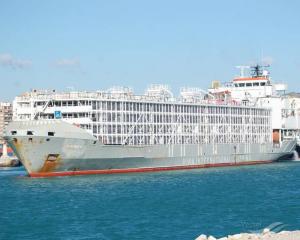Will the Marpol Treaty make it more expensive to ship New Zealand goods to markets overseas? Chris Tobin reports.
The Ministry of Transport says it is pleased with the interest and feedback received on whether New Zealand should sign up to the international Marpol Treaty for the prevention of air emissions from ships. The treaty is likely to have implications for New Zealand's agricultural sector.
Comments have been made that the treaty - a set of rules devised by the International Maritime Organisations and mandated by the United Nations - will make it more expensive to ship New Zealand goods to markets overseas.
Annex VI of the treaty intends to regulate emissions that are considered harmful to public health, deplete the ozone layer and contribute to climate change.
The Ministry believes the treaty would have benefits for New Zealand by improving air quality around New Zealand ports and harbours; providing investment certainty to domestic ship owners and fuel suppliers and demonstrating dedication to a ''level playing field'' for international maritime regulation that would benefit New Zealand as a trading and maritime nation.
However, the ministry acknowledges it will have costs.
''Its regulations would impose costs on ship owners and operators, and their customers. Ships burning heavy fuel oil would need to switch to low-sulphur fuel.
''Annex VI impacts on New Zealand will increase over time, whether we accede or not. Our ships already need to comply with its requirements when visiting foreign ports. Foreign ships in our ports will need access to low-sulphur fuel from January 1, 2020.''
A Federated Farmers spokesman said it seemed ''highly likely'' the Government would sign the treaty.
''The impact on whether New Zealand signs up or not to international shipping would probably be minor given 96% of
our shipping trade is carried on ships from countries already signed up to Annex VI.
''There would be more of an economic impact on coastal shipping and the Marsden Point oil refinery and these implications will have to be carefully considered by the Government.''
It is expected the cost of making Marsden Point capable of converting all high-sulphur residues to meet treaty requirements will be extremely expensive.
The New Zealand Shipping Federation has stated: ''The cost of retooling Marsden Point to convert all high-sulphur residues to Marpol-compliant product will be high and prohibitively expensive.
''The refinery is currently exploring if it is possible to produce smaller volumes of 0.5% sulphur fuel, and what may be required to achieve this. This has not yet been fully scoped nor costed.
''Whether Marsden Point eventually produces low SOx fuel will be a commercial decision for the refinery.
Also, comment has been made the increased costs international shipping must make by 2020 will be handed on, and particularly to countries such as New Zealand which are far from markets.
It is believed also that the transition to a low-sulphur diesel or gas oil fuel is likely to push up global prices of low-sulphur diesel sharply.
New Zealand relies on international shipping to move 98% of its imports and exports.
Mot manager international connections Tom Forster said they had received feedback from a wide range of groups including the Shipping Council who represent exporters including those working alongside the agricultural sector.
''We will review submissions. So far we have been pleased with the level of understanding and engagement of the issues surrounding Marpol across the sector, the public and interest groups.''
Consultation closed on Monday.
-By Chris Tobin













